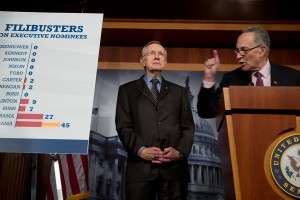
Sen. Charles E. Schumer (D-NY)(right) with Sen. Majority Leader Harry Reid (D-NV)(center) show how filibusters have spiked under the Republican Senate minority in recent years, with an increasing number being used against high-level presidential nominees. Last week, the Democratic-led Senate voted to remove the option for such nominees to break the blockade of President Obama’s cabinet and federal judiciary picks.
– Stephen Crowley, New York Times photo
Washington (PAI)—In an historic vote to block obstructionists tactics by Republican Senators, the Senate voted 52 to 48 last week to change filibuster rules that had allowed the Republicans to block presidential appointments to federal courts and important federal agencies. The vote will allow those appointments by a simple majority vote of 51, rather than 60 votes.
Senate Democrats and President Obama said the 60-vote requirement had prevented the President from carrying out his responsibilities.
Labor leaders cheered the decision as an important step toward restoring democratic procedures to the senate.
PRO-DEMOCRACY
The Communications Workers, who have been pushing for filibuster reform as part of their overall pro-democracy campaign, cheered the senate’s decision.
Doing so will clear the way for Senate approval of presidential nominees to important executive branch posts and federal court seats – both important in carrying out policies that affect workers and their allies, the union said.
But the filibuster rules change still will require 60 votes for Supreme Court appointments and legislation, such as the Employee Free Choice Act.
“The Senate action re-enforces the intent of…the U.S. Constitution, which clearly states the Senate’s obligation of advice and consent is based on majority support, not super-majority support. This is a good first step toward restoring a Senate that functions as an integral part of our democracy,” said CWA President Larry Cohen.
WHO’S RADICAL?
Cohen also debunked Republican claims that the rules change is “nuclear” and revolutionary. “Instead, it is the Republicans’ recent strategy of preventing up-or-down votes on qualified nominees without respect to their merits that has been a radical departure from Senate history,” he said.
“Working people expect their leaders to maintain a functioning government that works for them and the labor movement will continue to hold those leaders accountable to do just that,” added AFL-CIO President Richard Trumka.
Trumpka said the GOP had been using the filibuster to try to nullify the results of the 2012 presidential election.
FED-UP
A fed-up Senate Majority Leader Harry Reid (D-NV) pushed through the rules change after constant GOP filibusters – upheld by getting at least 41 votes every time to bar up-or-down decisions – halted three Obama administration nominations to the U.S. Circuit Court of Appeals for the District of Columbia. That court rules on most appeals from National Labor Relations Board and other agency cases affecting workers.
The change requires only a simple majority of senators to vote for debate and ultimate up-or-down votes on judges, except Supreme Court justices, and executive branch and regulatory agency nominees.
That includes NLRB nominees. The GOP had used the filibuster rule to prevent up-or-down votes on Democratic President Barack Obama’s NLRB hopefuls until lawmakers reached a last-minute compromise in August – sidelining the filibuster rules change Reid planned then. But the Republicans then broke that compromise on the appeals court judges and Reid, having had it, pushed the rules change through.

